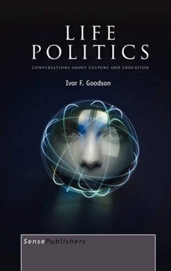Life Politics: conversations about education and culture
Mediation is the Message
QUESTION: In our conversations you use the word “battle’. You were speaking about the battle of curriculum, and the battle of democratic education. And since you speak about battle in curriculum, you speak about theory battle...
IVOR: It’s back to this issue about passion or objectivity. I think that one of the things that most disappoints me the most about intellectuals is the kind of dissected, dispassionate withdraw from the world which is almost a plastic common-sense image of the intellectual, as someone who sits on the computer 14 hours a day and (hits) in his theories, and never goes outside, and fights that battle just in a textual way. And I used the word battle again. I think it’s a much more passionate game, I mean I think what keeps us alive as human beings and afterwards intellectuals, human being first, intellectuals second, is a passionate engagement with the issues. That’s what puts the light in people’s eyes. And you look around at any colleague, and there’s an absence of fire. Is that true or not.
QUESTION: Listening to you I realize that I have thought about “battle” in a different direction and I ask myself about the meaning of what you call the process of refraction...
IVOR: Refraction really, it’s in a sense another word talking about mediation, isn’t it? So let’s give an example of refraction, a global example. Perhaps we can give a concrete example. So, the big global force is coming to Argentina. And they legislate a number of changes that Argentinean education must adopt, a number of reforms in the new government, promises through the new minister that the new reforms will be put in place in Argentina. That’s the beginning of the promise, the beginning of structural readjustment. The promise is made, the deal is made. The money comes forward. That’s only the beginning though. The process of refraction or mediation led by. At some point the agreed structural readjustment has to be handed over to ministries, and professionals and intellectuals to be negotiated and battled over. And in that battle, what was an initial intention will be refracted into a so called policy parameters and activities. And in that refraction, there will be a displacement between the original agreed structural readjustment and intentions and the actual policies and activities and parameters that are defined, and in that moment of refraction, in that moment of mediation, in that moment of battle, if you will, between particular forces, that is the moment of understanding. Not the moment of structure intention. And not the moment of final activity, but the battle over interpretation mediation refraction of the original intention. That’s how, that’s the process - in my view - which power goes through when it issues a dominating embark for structural adjustment. That’s the intention, but that’s not what comes out in the end. What comes out in the end changes in each national situation or in each context. For example, if the headmaster of the school drives the same kind of structural readjustment, and he will abolish subjects (or what turns up?), that will be played out differently within each department of the school, each subject, each micro-world inside the school will refract the headmaster’s dominant intervention. And it will be a mediated battled over and it will come out differently. So social life and social activity is always a process of refraction. Not just from one to the other, but through a number of levels. You can go from macro structural adjustment announcements, through to the most minute habitus. And the refraction (…) continues through the various levels. So that the actual habitus which comes out, as you said, you may have a very unintended habitus coming out from a dominant proclamation. Very likely anyway. So the task of the analyst is to understand the process of refraction. If you will, the series of battles and micro politics that go on after a structural intervention. That’s our task. Not to understand the structural intervention only, but to really understand processes of social refraction.
